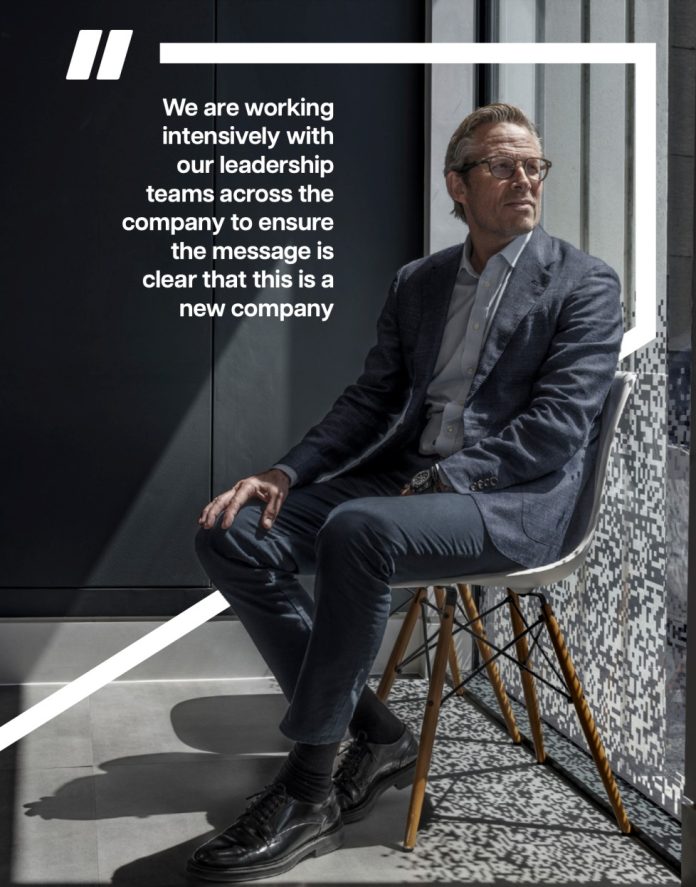In 2024, SBC Leaders magazine has published a lot of important articles and interviews. This time, we look back at the interview with Evoke CEO Per Widerström and Chief Strategy Officer Vaughan Lewis, who talked about one of the most complex and transformative deals in the history of the industry.
Evoke CEO Per Widerström continues to stay the course. If we were to count how many times he says “value creation plan” during our conversation, the number would surprise you.
It’s all part of Widerström’s method. He needs to constantly monitor everything that’s going on at Evoke as he seeks to unite two companies with very different cultures. It’s been two years since 888 acquired William Hill, but they’re only now starting to look like one company.
888 and William Hill are both traditional brands with real heritage, but as Widerström admits, they’ve lost their way a bit in recent years.
There’s a perception that 888 has squandered over 20 years of digital expertise and market leadership, falling behind SkyBet and bet365, and missed the boat on entering the US. That’s why it’s lost its market leadership.
Three years ago, it hired a new chairman, Lord John Mandelson, and chief strategy officer Vaughan Lewis to turn things around and redefine the direction of the company. A few months later, an opportunity arose to buy William Hill from Caesars Entertainment.
It was the kind of opportunity 888 had been yearning for since losing a bidding war with GVC Holdings for bwin.party in 2015. It wasn’t even its first bid for William Hill – a joint bid with Rank Group stalled in 2016. This time, 888 won the Caesars auction. But what followed was one of the most complex transformations the industry has ever seen.
It was such a comprehensive transformation of the business that the entire history of 888, with its legacy that had been so strong for so long, was almost completely erased from the corporate picture.
“We discussed how a transaction of this scale would create a completely different business, and that comes with challenges,” explains Lewis. “There are always alternatives such as smaller bolt-ons in high-growth markets. We analysed a whole range of options but there are not many businesses that could immediately give us the scale, technology and brand recognition that William Hill could.”
Cultural reset
Widerström is approaching the end of his first year in charge of the company previously known as 888 Holdings. His first mission was to complete the integration of William Hill. The second was to transform the company’s identity. His next, the one he will really be judged on, is to transform its financial fortunes. And this is where the value creation plan comes in.
When we meet at Evoke’s London headquarters, the company is just one month into its life as a rebranded entity. The purple and teal branding behind the reception desks greets visitors in a blaze of freshly-minted sticky-back plastic and is displayed on walls and TV monitors around the office.
Widerström has accomplished the first part of his mission. The company formerly known as 888 Holdings is unrecognisable from its previous self. Evoke has arrived.
Strolling around the company’s London HQ it feels a little more like the company formerly known as William Hill but it bears little resemblance to 888 Holdings. If you speak to one of the legions of 8sters who have left the company since the merger with William Hill they will generally sigh, weep or rage about the transformation of the company they knew and loved.
This is the price of progress but it was also a necessary step for a company that had fallen far behind its peers.
“When we signed the deal with William Hill it was very clear to us that the people managing Israel would not be the people managing the merged company,” says one of those former 8sters, who was based in Israel. “They were not British enough, not executive enough and not formal enough. 888 was something of an anomaly in being predominantly a British company but with the entire operation being based in Israel.”
William Hill’s acquired offices have widened the operational base and the Israeli executive team that previous CEO Itai Pazner led has been completely dismantled. Back then the entire management team was based in Israel. Now, nobody is. Widerström calls it “a cultural reset”. More bluntly, it has been a brutal restructuring.
A turbulent transformation
Widerström joined the company 15 months after 888 completed its reverse takeover of William Hill and almost 10 months after previous CEO Pazner had left the company. Before Widerström had even started in his new role it became clear that the company needed pulling together.
During the three months between getting the job and starting, Widerström travelled to the company’s offices around the globe on a fact-finding mission.
“As I wasn’t CEO yet, people weren’t expecting me to say anything but I had the opportunity to listen. And whether it was Manila, Herzliya, Kraków or Gibraltar, one of the key messages was that we are not one company. It was clear we should have one new corporate identity. Of course, it goes beyond just a name and a logo. It’s the substance behind it, the values, the type of behaviour we would like to have,” explains Widerström.
The company identity was not the only thing that needed fixing when WIderstrom joined. 888 Holdings was reeling from a series of compliance failures and worsening macroeconomic conditions that had shifted the William Hill integration from a tricky balancing act to a massively aggressive cost-cutting plan.
Soon after announcing and signing the William Hill deal in September 2021, the UK Gambling Commission placed the three William Hill businesses (William Hill Online, William Hill retail and Mr Green) under licence review.
As competitors, the 888 management team was unable to get all the details of the review. This made it almost impossible to raise the debt or the equity needed to fund the deal. In the background, the war in Ukraine had erupted, oil prices had gone through the roof, and inflation rates were rising.
888 had originally planned to raise about £500m of equity and around £2.1bn of debt to fund the acquisition. At interest rates of around 4 or 5 per cent it would have had annual interest costs of £60-70m a year.
By the time licence review became apparent, it became clear that 888 would have to negotiate a discount. Caesars dropped the price by £250m but 888 could only raise £160m of equity – the most it could raise without a shareholder vote or a rights issue. So it needed more debt but the cost of debt had gone up from around 4 per cent to around 9 per cent, meaning annual interest costs had shot up to £170m a year.
Meanwhile, the compliance team, which had been overhauled in the light of the William Hill licence review, identified chronic compliance failures in the Middle East. Enhanced due diligence thresholds on VIP customers were too high and were not being applied consistently.
Chairman Mendelsohn wasted no time accepting Pazner’s resignation and took the reins while leading the search for a CEO. He needed someone with icy analysis and ruthless execution to continue a restructuring that had been knocked further by both companies’ compliance failures.
“It’s been a very challenging period,” says Lewis. “And it will continue to be challenging for a while. But it has put the company in a position where it will be sustainable and capable of podium positions well into the future.”
It took Mendelsohn six months to settle on Widerström as the new CEO. His previous roles include a salutary lesson on M&A as Chief Integration Officer at bwin.party, CEO of Expekt, managing Director of Gala Interactive and Group CEO of Fortuna Entertainment Group.
“Fortuna was a massive scale-up,” says Widerström. “From an EBITDA of €25m, we grew by five or six times in four years.”
The process was so successful that Widerström is using the strategic template from his time at Fortuna and replicating it at Evoke. It consists of five strategic initiatives: how to build a winning organisation; how to build a customer lifecycle management process; how to deliver a more distinct customer value proposition for each of their brands; how too make sure they have a product and tech roadmap that is customer-first and actually delivers value; and responsible gambling and sustainability.
“You can say it is very broad but it is about how you define what each initiative should deliver,” explains Widerström. “We are super-focused on defining those and also how you measure the incremental impact.”
The new team at the top
Since joining Evoke, what has impressed colleagues most is Widerström’s clarity of vision and the sheer brutality of his words and actions when needed. This reality is far removed from his calm demeanour and somewhat bland public statements, which tend towards the greyest management consultant speak.
For example, when he talks about “refining the operating model to make sure we are a more lean and agile organisation”, he is talking about a lot of departures. He has had to accelerate a restructuring that had been dragging on for 15 months and was nowhere near completion when he joined the company.
His new executive management team has been recruited from outside the organisation to ensure a clean slate. Lewis is the only executive who predates Widerström’s time in charge.
“We are working intensively with our leadership teams across the company to ensure the message is clear that this is a new company. It is a new beginning,” says Widerström. “It is about identifying the best of both cultures and bringing it to the new one. Nine out of 10 of the excom do not have a legacy in either company. It is a clear message that we are here for Evoke. It’s a new journey ahead of us.”
“When we are looking ahead with our value creation plan — the new strategy — we are instigating a new way of operation, which is more data-driven and more integrated with intelligent automation. Of course, then we are building a new culture as we go along. It is an ongoing process to make sure you have a fit for purpose, future-proofed culture and way of behaving in any living organisation in order to stay top in the industry.”
Fit for purpose, future-proofed, data-driven, intelligent automation; these are the buzzwords that Widerström falls back on throughout our conversation and throughout his presentations to the market but behind the buzzwords lies a gritty restructuring and a hard taskmaster.
Investors have yet to buy into Widerström’s vision with the share price languishing at around 80p. The Board decided to accept an £80m hit on revenue with a move away from dotcom markets after the Middle East VIP farrago. Given the minimal licensing and advertising costs of dotcom markets, the subsequent impact on profit was substantial but Widerström is bullish on the path ahead.
“We are profitable from an ebitda perspective,” he insists. “We are cash generative. The target is 5-9 per cent revenue growth per year, 10 basis points profit margin expansion, and deleveraging to less than 3.5x by 2026.”
These statistics underline the mantra he repeats time and again: “The value creation plan is about driving profitable growth, improving underlying margins and deleveraging.”
The shift away from dotcom markets and the extreme focus on value creation has made the strategic decision to withdraw from the US and focus on winning a podium position in four key markets – the UK, Spain, Italy and Denmark – all the easier.
“In the core markets we are clearly investing and scaling up to drive profitability. In other markets we are optimising cash flow. When we see opportunities to drive further growth, we will. But we cannot be everywhere,” says Widerström. “Going forward, beyond the next three to five years, we are clear what success looks like. One of the reasons I took this job is that we have two fantastic brands with significant legacies that perhaps seven to ten years ago were seen as the benchmark for how to operate in this sector. That has not really been the case for the last X years.”
“We would like this great company Evoke to be where it should be at the top. When it comes to how to get there, we have true belief in our organic growth,” he continues.
He says there might be some “high impact, low capital investments” or brand partnerships such as the rapidly-expanding 888Africa, but transformational M&A is off the agenda. Everyone has had quite enough of that.
Instead the focus will be on the nitty gritty of restoring two legacy brands through detailed operational excellence. Widerström believes he has the team in place to deliver that. The markets have yet to see it.
“Every quarter it is important to deliver that quarter,” Widerström concludes. “In any situation when you have a new team, you need to show the money. We need to communicate the proof points. It is a reset. It is a transformation of the business. We are absolutely focused on the value creation plan.”
Don’t forget to subscribe to our Telegram channel!











